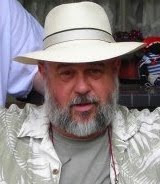The most common, and sometimes most dreaded, question asked of a musician is "what kind of music do you play?" A guy walking beside me one night in the Pecan Grove eventually quit talking to me because I couldn't condense "the kind of stuff I play" into one artist that he could recognize.
For some, it's easier than others - classical players or rock and rollers don't have to hesitate long; maybe the same with jazz and blues, but the breakdowns within these forms can also be extensive, as we all try to come up with labels that fit our particular sound so that people not listening to it can know what to expect.
Some of it is valid, some hogwash. 'Rockabilly' and 'Surf Music' became real things, but I couldn't identify a "Progressive Rock' song in the seventies, and I can't today, either. A certain local DJ gets wrapped up in whether a cut is 'Classic Jazz' or 'Straight-Ahead Jazz' and I end up screaming at the radio, " Quit drooling over the sound of your own voice and play the damn song."
It is possible that 'Folk Music' is hardest hit by this need to categorize, since in one way or another, it is the roots of the other forms, and one wonders where the separation must begin, and what, if anything, survives? When famous bluesmen or rockers put out an "unplugged" album, is that folk music? When Joni Mitchell or John Denver mesmerized thousands of people with just a guitar and their own voice, was that folk music? There are as many who would answer no to both questions as there are who would answer yes. Remember the folks who left after Bob Dylan brought out the Butterfield Blues Band for his second set at the '65 Newport Folk Festival? They were certainly justified in their passion for "Folk Music" but I think history has proven them wrong for "Good Music".
Many younger players today do not remember nor have heard about what Pete Seeger called "the great folk scare of the '60's". It was a very important time when great bluesmen had a brief respite from poverty to play New York folk clubs and college campuses, and other folk artists such as Joan Baez, Woody Guthrie, Pete Seeger and The Weavers achieved national acclaim, but also eventually faced widespread censorship for their left-wing views. There were bitter debates within the folk music community over what defined a "folk song" and how far a topical song should go in expressing sometimes radical ideas. Many separations born then still exist today.
Our own little folk festival in Winfield, Kansas, in 1967 was one of the very first Midwestern attempts to enter this national debate. Students at Southwestern College sought to define as well as showcase the incredible variety of American folk music as part of their own education. A really amazing thing, if you think about it. Talk about hands-on education.
Today, we have escaped controvery but lost some historical ground by referring to anything played without electric guitars as "acoustic music". This may be too generic to have any real value. I believe that it is still appropriate to ask -"What is folk music?". The organizers of the first Southwestern Folk Festival certainly thought so. That they expressed it by organizing a festival is phenomenal.
Next post, we'll enter the debate.
.
Thursday, September 27, 2007
Subscribe to:
Post Comments (Atom)

No comments:
Post a Comment